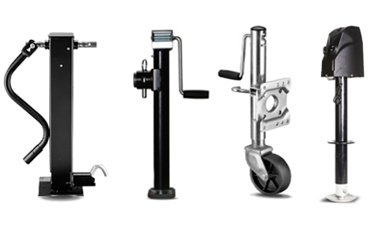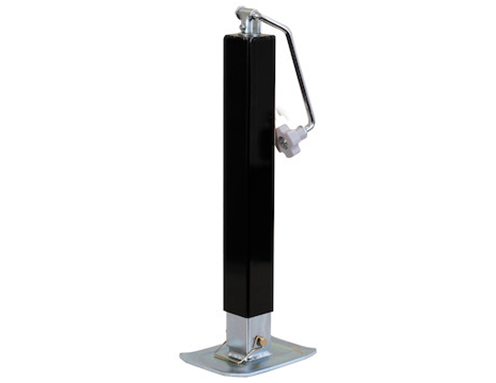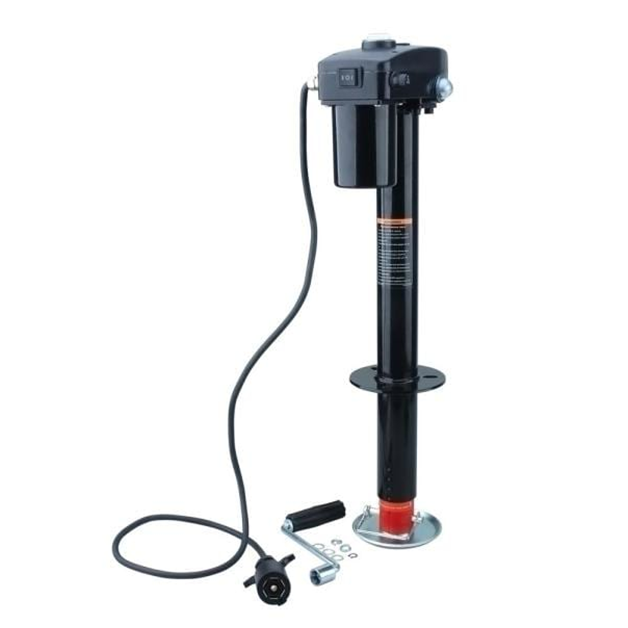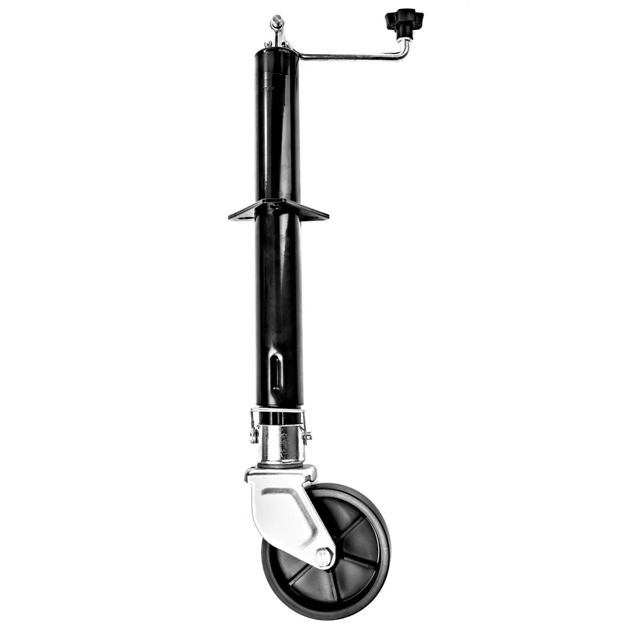
A jack is a mechanical lifting device used to apply great forces or lift heavy loads. Put, if you need to raise a particularly heavy object, a jack is what will help you do it. There are several types of jacks available for use, and they all depend on the purpose you intend to use them.
For this article, we will be looking at trailer jacks. A trailer jack is a specific type of jack used for trailers. You can also refer to a trailer jack as a hitch jack or tongue jack. The primary function of this jack is for raising and stabilizing a trailer attached to a towing vehicle.

2. When Should You Choose an Electric Jack or a Manual Jack?
3. What size & capacity do I need?
4. Lift Height and Range of Travel
5. Bolt-on VS Weld-on Trailer Jack
We have two types of trailer jacks: manual and electric. The difference between the two is already quite noticeable, but we will discuss it further.

A manual trailer jack usually has a hand crank to lift and lower the tongue. To operate this type of jack, you have to use your energy and muscles to raise and lower. This can be pretty stressful, and we reckon that not everyone can go through this process. However, if you are up for a good sweat and muscle-flexing, the manual trailer jack is a great option.
Moreover, from experience, the manual trailer jack is very durable. Rest assured that it would stand the test of time and last you for a long time.
A-Frame Trailer Jack: As the name implies, the A-frame trailer jack is designed explicitly for A-frame trailers. With this trailer jack, you can either bolt it or weld it on the trailer. They can also be completely drawn in to make way for safe travel.
Pipe Mount Round Tube Jack: The Pipe mount round tube jack is another manual trailer jack. The manufactures designed this type of manual trailer jack to mount onto the trailer frame with a weld-on installation. It also has a swivel design to ensure plenty of clearance while towing your trailer.
Swivel Jacks: Swivel jacks are named after the swivel feature. A swivel allows the jack to pivot on its mounting point. It also helps to move up and out of the way for travel. The swivel jack is available in different weight capacities, and you can get one to suit your needs.
Square Jack: The square jack is designed for relatively heavy-duty usage. For maximum hold and strength, they are usually welded onto the frame of your trailer. Besides, they are also available in different weight capacities according to your needs.
Heavy-Duty Trailer Jacks: As the name implies, the heavy-duty trailer jack carries a lot more weight than other types of hitch jacks. With a heavy-duty trailer jack, rest assured that you will be able to lift any trailer.
Scissor Jack Stabilizing Jacks: The scissor jack or scissor stabilizing jacks help stabilize bigger campers and are usually located at the back of the trailer.
Marine Jacks: The marine jacks are specially designed to endure regular water exposure and are used by fishermen or boating enthusiasts. If you need the jack in water, you should go for them as they have a unique finish that makes them corrosion resistant. Not only that, but they often come with wheels too.

An electric jack is a jack that well, is electric and does all the work for you. With an electric jack, all you have to do is to connect it to your battery and select which way you want it to go, up or down. It is that easy. However, because it has more components than a manual jack, it is a little less durable, but it should still stand the test of time. Besides, most electric jacks also have a manual hand crank that can help if your battery goes off. In light of this, rest assured that you will be able to use the jack even when out of power.
PROS
CONS
A-Frame Electric Trailer Jack: The A-frame electric trailer jack is a type of electric tongue trailer jack that can either be welded or bolted to your trailer, and you can find them in various weight capacities. They are commonly seen on travel trailers, utility trailers, etc.
Heavy-Duty Electric Trailer Jacks: Heavy-duty jacks come to the rescue when the A-frame trailer jack just isn’t doing the job. They have a much higher weight capacity than the A-frame trailer jack and will require brackets for more stability and support.
Side Mount Trailer Jacks: Side mount jacks come in three styles: drop-leg, pipe mounted, and pull-pin swivel, with drop-leg jacks having the highest weight capacity. These styles of hitch jacks are welded or bolted onto your trailer. They have a design that allows them to move out of the way for towing and lets them reposition into place for jacking.
When properly designed and fabricated, an A-frame tongue and a straight tongue should give similar results. It is more important whatever option you eventually go for is appropriately installed.
Using a straight tongue can allow your vehicle to be 90 degrees to your trailer when camping so that you can have easy access to the entire back without needing to jump over the trailer.

An A-frame tongue will provide more stability. If you were attaching to a heavy, fully loaded trailer, it would be advisable to choose it. If you have a small, regular trailer, a straight tongue should work well with no problems.

Choose a manual jack if:
Go for an electric jack if:
Size and capacity are essential factors to consider when picking out a jack for your trailer. There must be enough height for the jack to work with when you want to lift the coupler to clear the hitch ball on your vehicle.
To figure out the proper measurements, you need to measure from the ground to the bottom of the coupler. It would be best if you took this measurement when the trailer is on level ground.
Jacks also come based on how much they can lift. Every trailer weighs a certain amount, and the jack you choose has to support the weight of the front of your trailer.
To know precisely what jack will be a good size for your trailer, you have to see the weight of your trailer tongue. The best way to calculate this is to weigh both your trailer and weigh your trailer tongue. The weight capacity of the trailer jack you eventually choose depends on your trailer’s tongue weight.
Generally, the trailer tongue should not weigh more than 15% of the total trailer weight. For a boat trailer jack, the tongue weight should be about 7-10% of the weight of the fully-loaded trailer. For example, if your loaded trailer weighs 6000lb, you will need a trailer jack with a weight capacity of 420lbs to 600lbs for a boat trailer and about 900lbs for others.
Things will be a little bit different if you use a weight-distribution system. If you use this system, then in addition to knowing the weight of your trailer tongue jack, you will also need to know the weight of the back end of your truck. You will need a jack that can support both the tongue weight and the truck end weight.
When you know what the tongue plus back end of your trailer weighs, you will be able to make an informed decision on what weight capacity your tongue jack should have. You can easily get a tongue jack to meet your needs on the market at a reasonable rate.
There are things you have to put into consideration when choosing a trailer jack. One is the amount of travel between the up and down position and the total amount of extension you will get from the jack. With smaller jacks, you will get about 10 inches range of travel. Bigger, heavy-duty jacks will get you about 15 inches.
To get the correct height measurement, you will need to measure your trailer and tow vehicle.
Tongue jacks attach to your trailers in two ways; bolt-on and weld-on. Bolt-on and weld-on trailer jacks are almost as equally effective. Welding, however, can be a lot stronger than bolts if it is done by someone who has the experience and knows what they are doing.
It does not mean that bolt-on applications are not effective and that they cannot handle the weight because they can. If you plan or need to replace the jack in the future, bolt-on jacks are a better choice. Weld-on jacks are more permanent and will be a bit more challenging to replace.
So, depending on your needs, what you think the future may look like, and what options you have readily available, you can go with either one.
Generally, most people prefer side wind because they find it much easier to use. But let us take a closer look and see why that is the case. Also, so you can decide for your unique self and situation.
Choosing between a side wind or top wind jack will be based on several factors. Each option has its strengths. If you are experiencing clearance issues with the top wind radius, you would go with the alternative and choose a side wind. Likewise, if you have the same problems with the side wind, you would pick a top wind.
It is worthy of note that people generally find it easier to turn a side winding jack. However, for situations where the tongue is lower to the ground, it is advisable to go for a top winding jack. The reason is that you would not have to bend down as much, and it would not be as awkward to turn.
Besides, a sidewinding jack typically has inner components that are easier to access and replace. Basically, would you prefer to crank the jack horizontally or vertically? Top winds are a bit more awkward to crank, especially underweight.
A leg extension is a good idea if your jack does not come with an extension. Some jacks have a leg that drops and brings the bottom of the jack closer to the ground before you even start lowering it. It is good because it saves you power, whether you are using a manual or electric trailer jack.
Some people choose to stack boards under the jack, which might look like a good idea, but we strongly advise against it. This method can make the front of your trailer unstable. And besides, any sudden movement can make your rig fall off of whatever you have stacked underneath the jack. When this happens, it can cause damage to the trailer or injury to you. Therefore, a leg extension is a good idea as a general rule for safety and ease of use.
It can be highly overwhelming trying to figure out what type of jack you need. There are many important factors to consider and also many options in the market to choose from. The most important things to note are these:
We hope this article will help you make a more informed choice on your journey. Good luck!
Our trailer parts expert will answer your inquiries within 12 hours.

Tow-Max is a trusted supplier of trailer parts in China, known for its huge variety of products and one-stop services. We have been supplying customers from Australia, South America, the USA, and the Middle East. Our business partners are located in Sydney, Melbourne, Adelaide, Mexico City, Dubai, etc.
No.163-1, Shang yang Road, Dongqian Lake Industrial Zone, Ningbo, 315121, Zhejiang, China
+86-574-8786-2718
+86-574-8786-2717
sales(at)soaringtrailerparts.com
©Copyright 2020. Tow-Max. All rights reserved. Powered by MML.